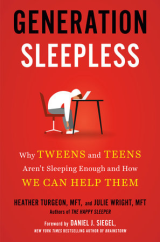Excerpted from “Generation Sleepless” (Penguin, 2022) by Heather Turgeon and Julie Wright.
Little kids and teenagers model their behaviors (often subconsciously) after their parents, so if your phone is an appendage and your attention is continually drawn to it, this behavior pattern is more likely to be adopted by your kids. When you practice basic boundaries and good screen habits, this also rubs off on the whole family. Not only that, it signifies to your teen that your own sleep and well-being are a priority.
 Parents have room for improvement in this arena: the majority of parents say they sleep with a mobile device next to their bed, and about 1 in 4 say they wake up to check their phone in the night. If you ask children about their parents’ screen behaviors, many will express disdain for the phone and say their mom or dad is always on it, and it’s hard to get their attention. Half of adolescents say their parent or caregiver is distracted by their cell phone when they’re trying to have a conversation with them.
Parents have room for improvement in this arena: the majority of parents say they sleep with a mobile device next to their bed, and about 1 in 4 say they wake up to check their phone in the night. If you ask children about their parents’ screen behaviors, many will express disdain for the phone and say their mom or dad is always on it, and it’s hard to get their attention. Half of adolescents say their parent or caregiver is distracted by their cell phone when they’re trying to have a conversation with them.
Most parents are aware that babies and little kids need our attention, but we don’t appreciate how much teenagers do, too. They pick up on signs of distraction, like when our eyes are glued to a screen, when it takes many attempts to get our attention, or when we pick up our phones in every down moment as if the device is more interesting than the moment in front of us. It’s a huge relief to kids when we watch and listen. It makes them feel seen, validated, and understood. This is not just something we save for a big moment of “Hey, Mom, I need to talk to you.” Rather, teens pick up on our nuanced distraction all the time. In addition, if you regularly talk, text, and type in designations on your phone while you’re driving, your teen won’t take you seriously when you tell him how dangerous distracted driving is.
The irony is that parents are much more likely to turn to their phone when a child is acting out or a teen is non-responsive or withdrawn, creating a further breakdown in communication when they need us most. In these difficult moments, it’s easier to retreat to our corners and not to deal with what’s going on under the surface. It makes perfect sense that our instinct is to distract ourselves from the reality of how hard these moments can feel, but as we grow the habit of escaping to our screens, we get rustier and rustier at effective communication with our kids. By not giving up and turning to your own devices, you are refusing to be influenced by a force, created by technology, that is carrying you further and further from your teen.



